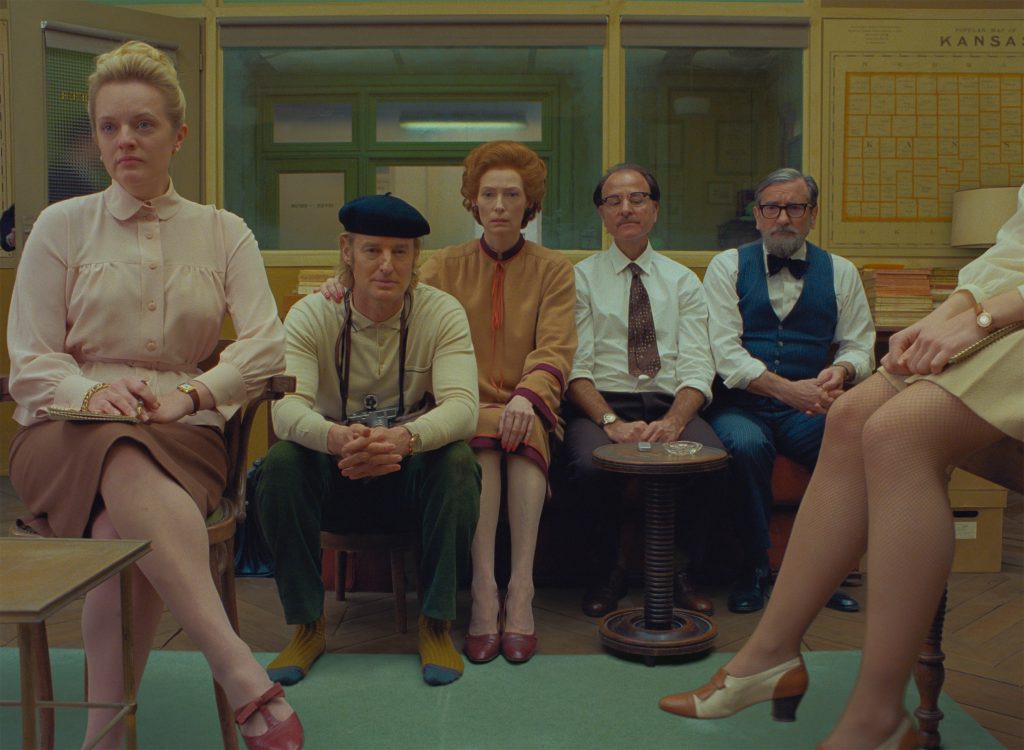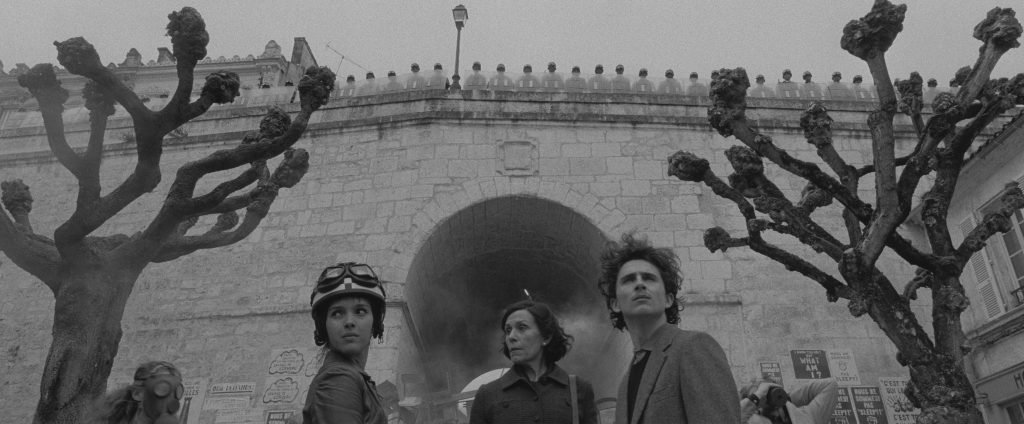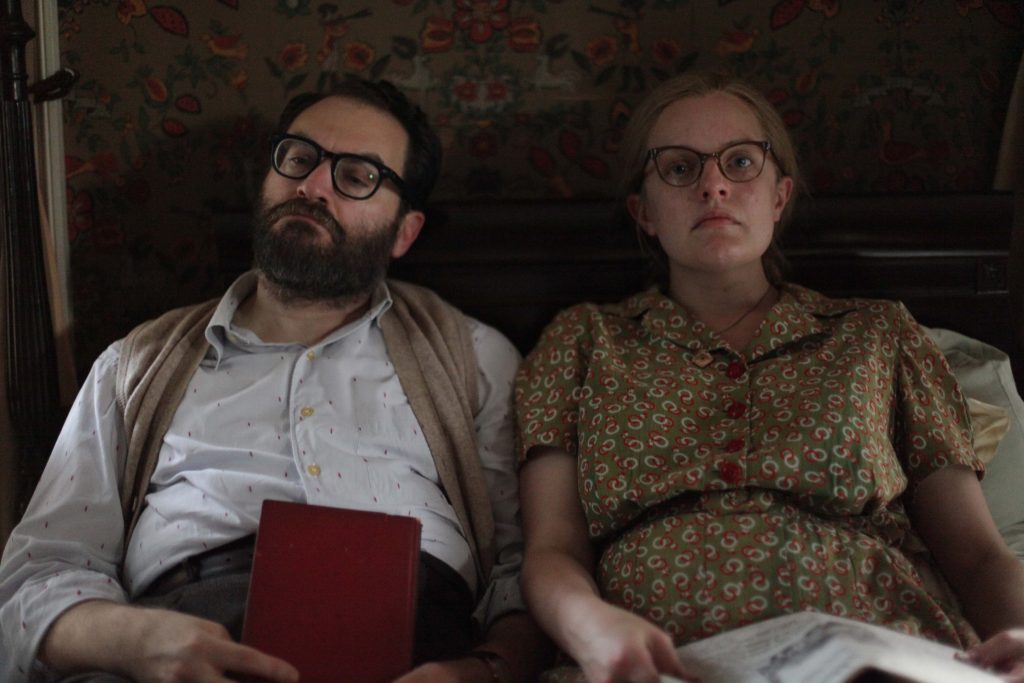November 17, 2023
by Carla Hay

Directed by Taika Waititi
Culture Representation: Taking place in 2011, mostly in American Samoa, the comedy/drama film “Next Goal Wins” (based on real events) features Asian/Pacific Islander and white characters representing the working-class, middle-class and wealthy.
Culture Clash: A hard-drinking and volatile soccer coach is exiled to work with the American Samoa National Team, which hasn’t scored a goal in years.
Culture Audience: “Next Goal Wins” will appeal primarily to people who are fans of filmmaker Taika Waititi, star Michael Fassbender, and “against-all-odds” sports movies that are very corny.

“Next Goal Wins” should’ve been a creative and exciting sports movie, considering the uniqueness of this true story. Instead, it overuses tiresome clichés of a grumpy outsider training a ragtag team. The dull comedy and ethnic stereotypes are cringeworthy. “Next Goal Wins” had its world premiere at the 2023 Toronto International Film Festival.
Directed by Taika Waititi (who co-wrote the subpar “Next Goal Wins” screenplay with Iain Morris), “Next Goal Wins” is based on a true story of how Dutch-born soccer coach Thomas Rongen transformed the American Samoa National Team from being on a losing streak of never scoring a goal in games for years to being a team capable of scoring goals and winning games. This story was also the subject of the 2014 documentary “Next Goal Wins.”
The scripted version of “Next Goal Wins” (which takes place in 2011) follows every single formula that has been done so many times already in similar movies, except the sports team in “Next Goal Wins” happens to have a transgender player. Waititi does occasional voiceover narration that’s supposed to sound folksy and whimsical, but it just comes across as annoying and unnecessary. Waititi also has a cameo role in the movie as an American Samoan priest.
In the beginning of “Next Goal Wins,” there’s a flashback to 2001, as the narrator explains that the American Samoa National Team experienced a humiliating 31-0 loss in a FIFA World Cup qualification match against Australia. Archival footage shows some of this match, as the narrator says the obvious: The American Samoan team is bad at playing soccer. The team hasn’t scored a goal in the 10 years since then.
“Next Goal Wins” then fast-forwards to 2011. The head of the American Samoa Football Federation is cheerful and friendly Tavita (played by Oscar Kightley), but he doesn’t have the respect of the team. How do we know they don’t respect him? While he was asleep, they used a marker pen to draw breasts on his face. Tavita has these markings on his face for a few days. It’s supposed to be a funny sight gag in the movie, but it just looks stupid.
Tavita’s wife Ruth (played by Rachel House) is fed up with the team never being able to win a game. At the spouses’ home, she tells Tavita what needs to happen to find a better coach for the team: “You have to go off-island.” Tavita and Ruth have a young adult son named Daru (played Beulah Koale), who is on the team and who dislikes this idea of finding a new coach from outside of American Samoa. “It’s treason!” Daru exclaims.
Ruth yells, “We’re getting a real coach!” And besides, Ruth tells Tavita and Daru, she’s already placed an ad to get a new coach for the team. The team has a coach named Ace (played by David Fane), who will be demoted to assistant coach when the American Samoa Football Federation finds a head coach who can “save” the American Samoa National Team.
Meanwhile, on the mainland United States, abrasive soccer coach Thomas Rongen (played by Michael Fassbender) is facing a four-person panel from the American Soccer Federation telling him that he’s been fired from his most recent team. Thomas still gets a chance to work for the American Soccer Federation, but he’s told that he’s being exiled to work with the losing-streak American Samoa National Team. Not surprisingly, Thomas is angry and insulted.
Making matters worse, two of the people who’ve made this decision are Thomas’ estranged wife Gail (played by Elisabeth Moss) and her current boyfriend Alex Magnussen (played by Will Arnett), the smug leader of the American Soccer Federation. (This love triangle scenario did not happen in real life.) Rhys Darby has a small and inconsequential role as another American Soccer Federation panelist named Rhys Marlin. Darby seems to be in this movie only because he’s a friend of Waititi, a fellow New Zealander comedian.
Also different from real life: The Thomas Rongen in this movie isn’t a native of the Netherlands. Instead of having a Dutch accent in this movie, Thomas Rongen has an Irish accent, because Fassbender has an Irish accent in real life. In this “Next Goal Wins” movie, Thomas is a stereotypical down-on-his luck coach with a drinking problem who hates having to work with a losing team.
The scenes of Thomas getting culture shock in American Samoa are unimaginative and boring. Thomas gets annoyed that every person who gives him a car ride in American Samoa is laid-back and won’t drive faster than 20 miles per hour. Thomas thinks it’s ridiculous that people in American Samoa want to work less hours than what he’s accustomed to on the mainland.
Thomas doesn’t understand the local tradition of “curfew time,” when people stop everything during certain times of the day to pray and meditate. Thomas becomes enraged when the team members tell him that they don’t want to practice on Sundays, for religious reasons. That’s why it looks so phony later in the movie when Thomas (who acts like he’s allergic to religion for most of “Next Goal Wins”) actually gets baptized in a body of water, with several members of the team in attendance.
As for the team members, only a few have memorable personalities. Daru is the team’s rebellious “bad boy” and is one of the team’s worst players. Jaiyah (played by Kaimana) is a transitioning transgender woman, whose name in her previous life was Johnny. Rambo (played by Semu Filipo) is a goofy and bumbling police officer, who somehow gets recruited to the team after he pulls Thomas over for erratic speeding on the road.
Other team members include Jonah (played by Chris Alosio), a promising young striker; Pisa (played by Lehi Falepapalangi), a large-sized goalie; and Samson (played by Hio Pelesasa), a long-haired midfielder. There’s a very hokey segment of the movie where Thomas and Jaiyah work together to track down former team members in attempts to convince them to play for the team again. The most notable of these former members is Smiley (played by Ioane Goodhue), a goalie who was on the team during the embarrassing 2001 FIFA loss and is the closest thing that the team had to a star player.
At first, Thomas clashes with Jaiyah the most because Thomas doesn’t understand what being transgender means. Jaiyah and Thomas get into a physical brawl after Thomas taunts Jaiyah by calling her by her dead name Johnny, even though Thomas knew how offensive that would be to Jaiyah. But in a sappy movie like “Next Goal Wins,” you just know there will come a time when the coach and player who started off as enemies will find a way to become friends.
The movie’s approach to soccer is incredibly simple-minded. Thomas announces to the team that his strategy is for them to work on “strength and discipline,” which he compares to being like “cheese and pepper.” The practice scenes are jumbled and filmed in a lazy way.
The team has a young fan named Armani (played by Armani Makaiwa), who’s about 12 or 13 years old. The movie treats him like a mindless mascot, because Armani doesn’t say anything in the movie, which never bothers to explain why this mute child has all this time to spend with the team. Shouldn’t he be in school? Where are his parents?
There’s also a very misleading subplot about Thomas constantly listening to voice mail messages from his teenage daughter Nicole (voiced by Kaitlyn Dever), who is always asking why Thomas won’t communicate with her. Why won’t he call her back? The answer, which is revealed near the end of the movie, is completely manipulative.
“Next Goal Wins” repeatedly shows that Thomas wants to get back together with his estranged wife Gail, but it never mentions why they broke up in the first place. The separation from Gail is supposed to make Thomas look lovelorn and sympathetic. But it doesn’t work, because he’s such a relentless jerk for most of the movie, until he goes through a sudden personality change after making a big speech.
“Next Goal Wins” has some heartfelt and well-acted scenes with Thomas and Jaiyah, but how they end up befriending each other looks too forced and contrived. The racial issues that were hinted at in the beginning of the movie, when Daru objected to hiring a non-Samoan coach, are warped to fit a “white savior” narrative, when “Next Goal Wins” becomes about Thomas and how he’s uncomfortable with Samoan culture. The movie treats the Samoans as all having to accommodate Thomas and eventually be willing to tolerate Thomas’ insults and tirades.
Outstanding sports movies about athletic teams make viewers feel like they know several members of the team, not just a few. Unfortunately, that isn’t the case with “Next Goal Wins,” which makes most of the team members utterly generic side characters. The Samoan team members in “Next Goal Wins” are portrayed as helpless dolts who need a rejected and rude coach of European heritage to make them into a winning team. It’s ethnic condescension at its worst. “Next Goal Wins” might have worked as a satire of sports movie stereotypes, but the movie’s comedy and overall filmmaking are as limp as a deflated soccer ball.
Searchlight Pictures released “Next Goal Wins” in U.S. cinemas on November 17, 2023.






